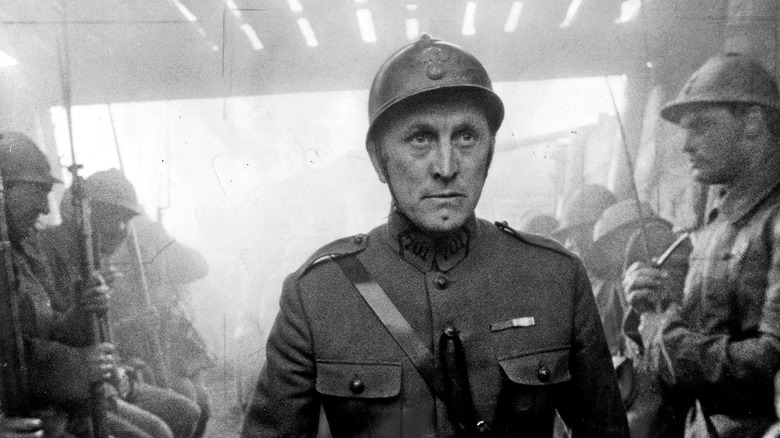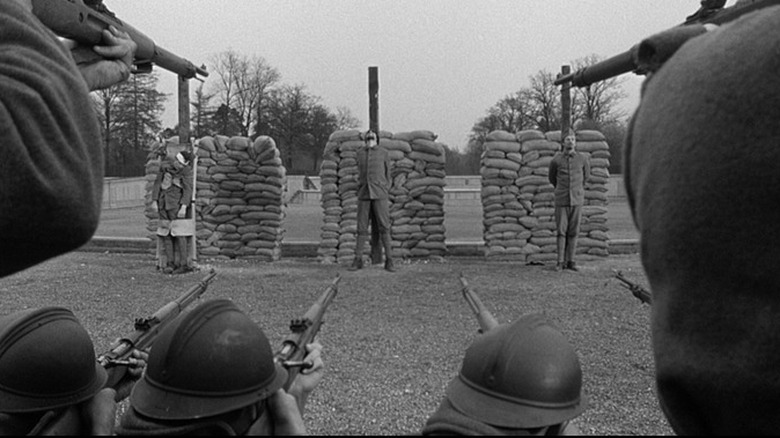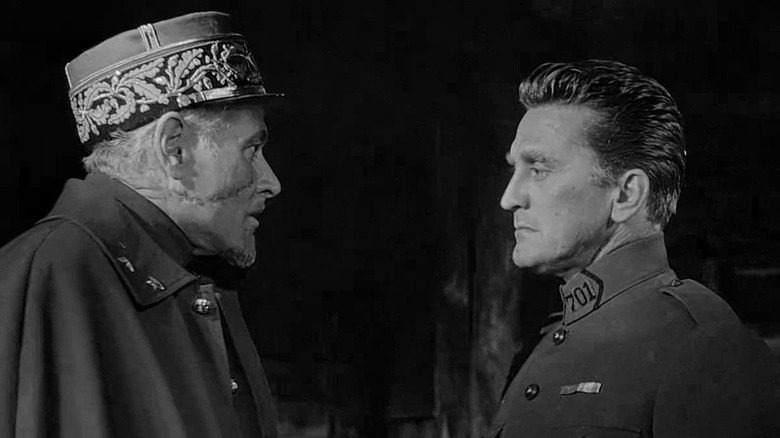Kirk Douglas Was Thankful Stanley Kubrick Stuck To His Guns With Paths Of Glory
Francois Truffaut famously said, "There's no such thing as an anti-war film." But if there's a counter-argument, it's Stanley Kubrick's 1957 "Paths of Glory." Contrary to its title, the film depicts battle as anything but glorious.
Set in France during World War 1, the film stars Kirk Douglas as Colonel Dax. After infantrymen under Dax's command refuse to charge into a suicidal attack, three men, Paris, Ferol, and Arnaud, are chosen to be court-martialed for cowardice and made an example of via execution. The Colonel tries his best to get them acquitted but to no avail.
In another movie, the three men might be saved at the last minute by Dax's ingenuity, but in a Kubrick movie, they're slowly marched to the firing squad and executed. The movie underscores the meaninglessness of their deaths by ending with an acknowledgment that soon, their comrades will be thrown back into the meat grinder of combat.
However, were it not for Kirk Douglas' insistence otherwise, "Paths of Glory" might've had a happy ending and proved Truffaut's point.
Scripting Paths of Glory
In a 1969 Interview with Roger Ebert, Douglas revealed how Kubrick almost changed "Paths of Glory" for the worse.
"You know, at one time with 'Paths of Glory,' even Kubrick wanted to cop out. He wanted to rewrite the script, make it a sort of B picture, a commercial thing. But I'm glad we stood by our guns. There's a picture that will always be good, years from now. I don't have to wait fifty years to know that; I know it now."
In that same interview, Douglas states that he's unsure whether he'll write an autobiography. "My life's too corny and typical to make a good autobiography," Douglas joked. Indeed, Douglas didn't write one memoir — he wrote four of them. In the first, "The Ragman's Son," he recounted butting heads with Kubrick on "Paths of Glory."
Douglas first became interested in working with Kubrick after seeing "The Killing." Once they met, Douglas agreed to fund "Paths of Glory" through his production company, Bryna Productions. When he arrived in Munich to shoot the film, however, he discovered Kubrick had replaced the script which sold him on the project. The new one was, in Douglas' words, "a catastrophe." He abhorred the new script's corny dialogue and sanitized ending, writing in "The Ragman's Son":
"The general's car arrives screeching to halt the firing squad and he changes the men's death sentence to thirty days in the guardhouse. Then my character, Colonel Dax, goes off with the bad guy he's been fighting all through the movie ... to have a drink, as the general puts his arm around my shoulder."
When Douglas asked Kubrick why he'd changed the script, the director answered, "To make it commercial. I want to make money." Douglas pulled rank, declaring the movie wouldn't be made if the original script wasn't restored.
The Kirk Douglas show
"Paths of Glory" has three credited writers: Kubrick, Calder Willingham, and the "dimestore Dostoevsky" Jim Thompson. Thompson had previously worked on "The Killing" and wrote the first draft of "Paths of Glory." Kubrick then recruited Willingham to write the second and third drafts.
According to the Jim Thompson biography "Savage Art," by Robert Polito, the second/third draft is what won Douglas over, while Thompson's first draft was the one he rejected. Polito speculates Kubrick's "mystifying" revival of the earlier script might have been him playing "ego chess" with Douglas, since Dax's role is also more prominent in the later drafts. Polito writes:
"Neither Humphrey Cobb [author of the novel] nor Thompson, for instance, has Colonel Dax dominate the court martial — a bravura turn for the actor in the movie's climactic and most eloquent sequence ... Perhaps the shrewdest way of summarizing the evolution of the various scripts is that 'Paths of Glory' was restyled steadily into a vehicle for Kirk Douglas."
Dax's role as the protagonist is clear by the film's third act. His last ditch effort to save the three accused is to report his superior General Mireau (George Macready) for friendly fire. It gets Mireau indicted, but doesn't stop the execution. Major General Broulard (Adolphe Menjou) initially assumes that Dax wanted Mireau's job and is stunned that he's an honest idealist. Dax lost his case, but he ends the film as the one honest officer and a moral victor.
Douglas probably did sincerely appreciate the message of "Paths of Glory" — he wouldn't have fought hard for the right script if he didn't. However, it probably didn't hurt his appreciation that he was the one who got to grandstand about that message.


